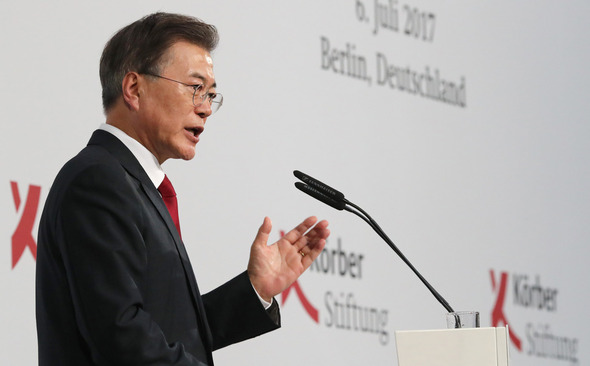 |
|
President Moon Jae-in gives a speech on the Korean peninsula at old city hall in Berlin, at an event organized by the Korber Foundation, July 6, 2017.
|
South Korea needs to chart an independent path for negotiating with the North
“Henry, I’m not here to ask your advice—I’m here to give you notice. This is something we have to do,” said Egon Bahr, who served as Secretary of the Chancellor’s Office under West German Chancellor Willy Brandt. Bahr was in a meeting with his American counterpart, Secretary of State Henry Kissinger, before West Germany initiated dialogue with the Soviet Union in 1970, in the middle of the Cold War. Bahr started by candidly explaining West Germany’s position and asking for Kissinger’s understanding. But when Kissinger voiced strong concerns, Bahr repeated his position without backing down. This marked the beginning of Brandt’s Ostpolitik, which ushered in a thaw that upended the Cold War order that had continued for a quarter century since 1945. Brandt’s boldness toward the US was remarkable. As is widely known, West Germany at the time was so dominated by American influence that it might as well have been conquered territory. As a defeated power in World War II on the front line of the Cold War, West Germany had limited diplomatic autonomy; as the country hosting the world’s largest garrison of American troops, it was heavily dependent on the military presence as well. West Germany was an economic giant but a political dwarf, and yet the prime minister of this “dwarf” turned the “order of giants” upside down. With his courage and candor, Brandt won his allies over to his grand scheme to reconcile West and East Germany, unify Europe and achieve world peace, and he eventually managed to make US President Richard Nixon and French President Georges Pompidou, who had initially been skeptical of Ostpolitik, into supporters of the plan. The “Moon Jae-in Doctrine” peace based on reason and morality The most important lesson that South Korean President Moon Jae-in can learn from this is that even countries that are weak on a political and military level can lead the way in turning a situation around through universal reason and moral authority. Just as the Brandt administration brought down the Cold War machine through the “Brandt Doctrine” of Ostpolitik, the Moon administration can transform the new Cold War alignment that has formed in Northeast Asia into a peaceful order through a “Moon Jae-in Doctrine,” based on humanity’s universal reason and morality. South Korea must no longer be a flunky to the US’s unilateral militarism and hegemonism. The Moon administration needs to declare the fundamental principles of South Korea’s foreign policy to the world. The Moon Jae-in doctrine must be a doctrine of peace that enshrines the principles of prioritizing peace over unification, using peace on the Korean Peninsula to move toward peace in Northeast Asia and around the world and opposing war under any circumstances whatsoever. The primary reason that the Moon doctrine is so necessary is because of the crisis on the Korean Peninsula. The Korean Peninsula is currently one of the most dangerous places on the face of the earth, and speculation continues that war might break out there after the Pyeongchang Olympics. The nuclear crisis on the Korean Peninsula has caused atomic scientists to move the Doomsday Clock forward to two minutes before midnight. Another reason that it is necessary to declare a new diplomatic doctrine is to bid farewell to the ghosts of the Cold War era. We need to move beyond the anachronistic Cold War mindset and toward a new order of peace on the Korean Peninsula and in Northeast Asia that draws upon post-Cold War creativity. Time for South Korea to boldly express diplomatic principles The Moon administration has the moral legitimacy to take the lead in establishing peace on the Korean Peninsula and a new order in Northeast Asia. None of the four powers around the Korean Peninsula have more democratic credibility than the Moon administration. The US is a sad example of the bankruptcy of populistic democracy; in China, the possibility of democracy being enacted is being extinguished; and both Russia’s “mafia democracy” and Japan’s “feudal democracy” are far from the modern democratic ideal. As the heir to the “candlelight revolution,” the Moon administration must take full advantage of the enhanced international prestige of South Korean democracy. Our greatest danger is not Kim Jong-un’s nuclear bombs or Donald Trump’s explosive rhetoric, but our sense of helplessness and our lack of conviction. The Republic of Korea is no longer a colony, a conquered territory or a client state. We must boldly express diplomatic principles that accord to our national interest and our national character as befits a truly independent and autonomous state. This is the perfect time to do so. By Kim Nu-ri, Professor of German Language and Literature at Chung-Ang University Please direct questions or comments to [english@hani.co.kr]






